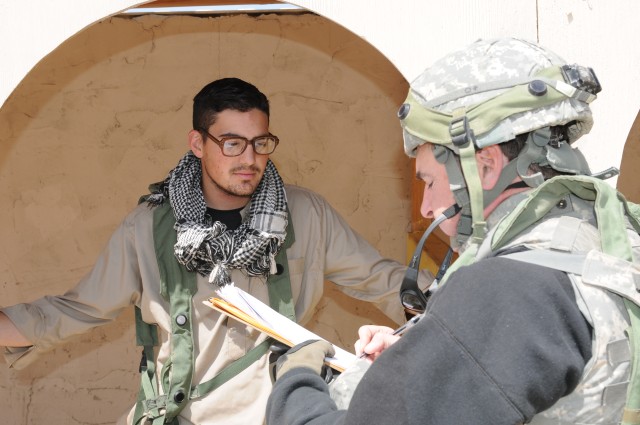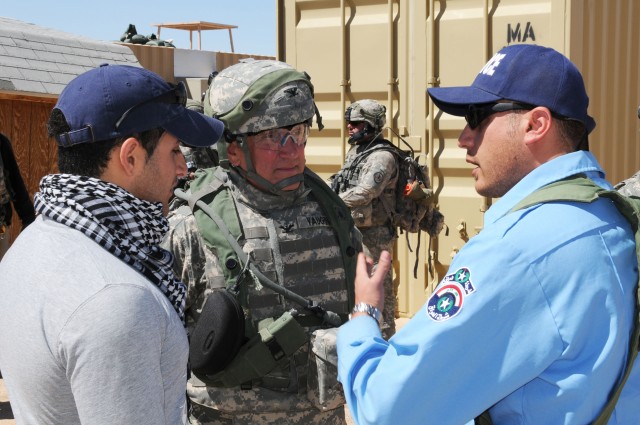FORT IRWIN, Calif. -- The role of U.S. Forces in Iraq continues to evolve with the launch of Operation New Dawn later this year, and the majority of efforts will be re-focused on the responsible transfer of authority to Iraqi Security Forces.
The Human Terrain Team, a specially trained group of Soldiers and civilians with a concentration on cultural awareness, will play a pivotal role in helping both the U.S. and Iraqi governments realize their goals for a stable and prosperous Iraq.
As the 3rd Armored Cavalry Regiment rotates through the U.S. Army National Training Center at Fort Irwin, Calif., in preparation for an upcoming deployment to Iraq, the Soldiers are joined by members from an HTT on training missions in simulated towns and provinces with Arabic-speaking actors.
The HTT is designed to interview local populations in their natural settings and environments and create a better system of communication between the Iraqi civilians, the U.S. military, and their own local, provincial, and national governments.
"The goal of the human terrain team is to provide knowledge of the local population and their way of life to the U.S. military commanders," said Col. Edward Vaughn, a Clarksville, Tenn., native with more than 32 years combined service in the active Army, National Guard and Army Reserves. Vaughn volunteered to come out of the Individual Ready Reserve to be a part of an HTT. "[We are there] to help them better understand the people and make better decisions."
Vaughn said there had been a slight communication failure in the past when accomplishing combat missions was the priority and not the welfare of the people.
"For a long time we followed the principle that the shortest distance between two points was a straight line, but now we need to stop and get to the know people and develop that bond, that trust," said Vaughn.
Once in Iraq, the members of this HTT will be assigned to an area of responsibility and work with provincial reconstruction teams, civil affairs and large command groups to realize the goals of the people. There are already approximately 15 HTTs operating in Iraq.
"The people of Iraq have been through decades of turmoil and are in need of assistance," said Dr. James Forsythe, a social scientist with the HTT training at the NTC. "They're building their own country back, and we want to help them in any way possible."
Forsythe has a doctorate in medical anthropology and became interested in the Army's HTT project because of a personal desire to make a positive and lasting impression in Iraq. Forsythe, a Decatur, Ga., native with prior service in the Navy Reserve, said the key lies in the development of cultural awareness.
"The role of the command group is increasingly focused on facilitating a transition," said Forsythe. "HTT has the ability, to coin an African proverb, 'to find a path to a clearing.' We are helping to build that path to that clearing and the clearing is an open space where Iraq can flourish."
The traditional, large-scale battles of previous wars are not comparable with the reality of insurgency-based campaigns, and the Army continues to adapt its doctrines and methods to achieve victory.
"It's not a force-on-force battlefield anymore," said Col. Christie Nixon, HTT member and former Army Reserve brigade commander. "It's a people battlefield."
Nixon is a Minneapolis native and firefighter with more than 27 years of service. She said the HTT is one of the most exciting Army initiatives in years and she volunteered to become part of it.
"The types of activities that the Army is going to be involved in for the short and long term future are culturally oriented, and we have to consider the people that we are going to impact," said Nixon. "The Army carries the standard of the United States all across the world."
Forsythe said that if the HTTs are properly utilized they can help prevent future conflict and help diminish local unrest before it manifests into violence.
"HTT is the Army's light touch with a heavy impact," said Forsythe.




Social Sharing